Coordinación
Una coordinación sólida puede evitar vacíos y duplicaciones en las respuestas humanitarias, así como garantizar que los PTM complementen otros tipos de asistencia. Sin embargo, el informe del «Estado Global de los Programas de Transferencias Monetarias» de la CALP Network muestra que la coordinación de la asistencia en efectivo es vista como débil y ad hoc, y que esto está teniendo graves repercusiones operativas.
Los donantes, las ONG y los líderes de los grupos de trabajo de transferencias monetarias (GTM) han pedido claridad sobre tres temas principales relacionados con la coordinación de la asistencia en efectivo:
- Quién debe ser responsable de asegurar una coordinación eficaz de la asistencia en efectivo;
- Cuál es la función y el mandato de los grupos de trabajo de transferencias monetarias, incluso en relación con las transferencias monetarias multipropósito;
- Cómo se debe dotar de recursos a la coordinación de asistencia en efectivo.
Tenemos que basarnos urgentemente en lo que funciona y proporcionar claridad a nivel mundial sobre las preguntas arriba mencionadas, adaptándonos a los diferentes contextos. Hace mucho tiempo que se deberían haber tomado decisiones claras basadas en necesidades operativas y no en la política de las agencias.
Prioridades actuales
El objetivo de la CALP Network es contribuir a seguir progresando en este tema en tres niveles: apoyar a los grupos de trabajo de transferencias monetarias a nivel regional; contribuir a soluciones prácticas para la coordinación de la asistencia en efectivo a nivel mundial; y convocar una discusión basada en la evidencia sobre temas clave, destacando puntos de decisión críticos y oportunidades de progreso.
Contenido destacado

Cash Coordination Tip Sheet
Guidelines and Tools
This tip sheet sets out established best practice, key guidance and resources for all aspects of cash coordination, intended as a clear, accessible and action-oriented guide for those engaged in coordination of cash and voucher assistance (CVA) at the field level.

Introducing the Cash Coordination Tip Sheet
Webinar
The CALP Network has developed a tipsheet setting out established best practice and key guidance and resources for all aspects of cash coordination, intended as a clear, accessible and action-oriented guide for those engaged in coordination of cash and voucher assistance at the field level.

Cash Coordination: A proposal from members in MENA
Blog Post
Earlier this year the CALP Network undertook regional consultations to explore options for cash coordination. This blog lays out recommendations from participants from the Middle East and North Africa who sketched out what cash coordination, and coordination more broadly, could look like in future to support a more effective, efficient and accountable response.
Últimos recursos
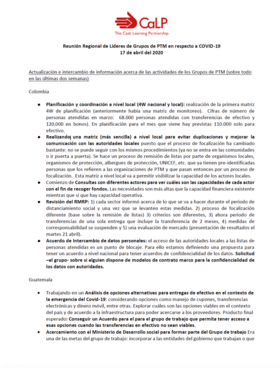
Acta de Reunión Regional de Líderes de Grupos de PTM en respecto a COVID-19
Informe
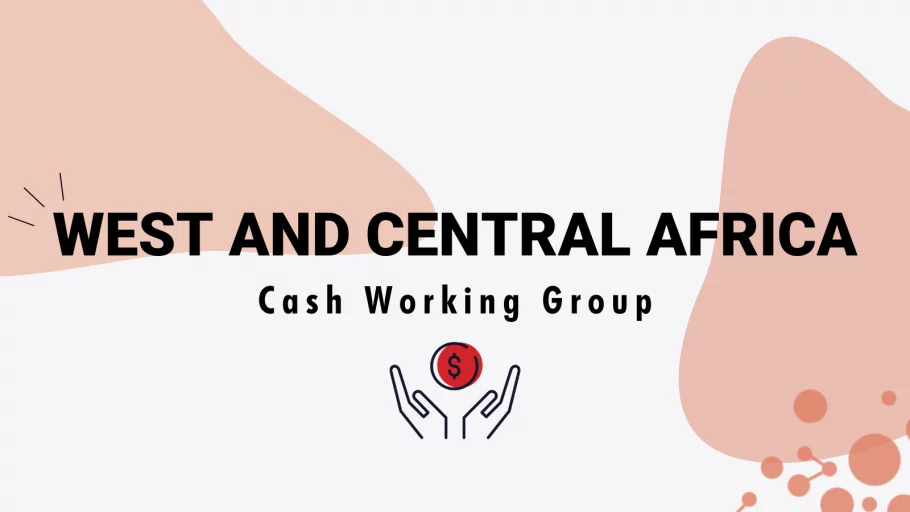
Minutes and recording from the WCAF regional CWG – 1 April 2020
Meeting minutes
Meeting on CVA and COVID19
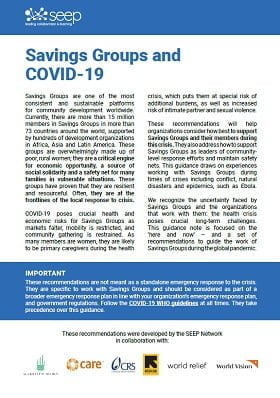
Savings Groups and COVID-19
Guidelines and Tools
COVID-19 poses crucial health and economic risks for Savings Groups as
markets falter, mobility is restricted, and community gathering is restrained. As many members are women, they are likely
to be primary caregivers during the health crisis, which puts them at special risk of additional burdens, as well...
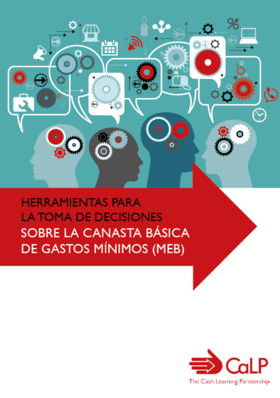
Herramientas para la toma de decisiones sobre la Canasta Básica de Gastos Mínimos (MEB)
Guía y herramientas
El propósito de este documento es acompañar a los profesionales y tomadores de decisiones durante las etapas clave del proceso de cálculo de la MEB con el fin de: (a) identificar el camino más apropiado a seguir de acuerdo con su contexto particular, objetivos identificados, capacidades existentes y...
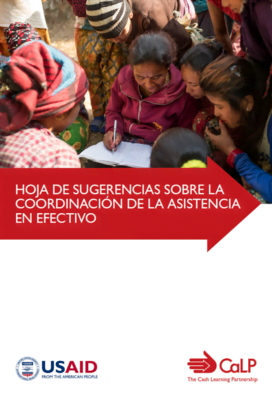
Hoja de Sugerencias sobre la Coordinación de la Asistencia en Efectivo
Guía y herramientas
Esta hoja de sugerencias establece las mejores prácticas establecidas, orientación clave y recursos para todos los aspectos de la coordinación de efectivo, diseñado como una guía clara, accesible y orientada a la acción para aquellos involucrados en la coordinación de los Programas de...
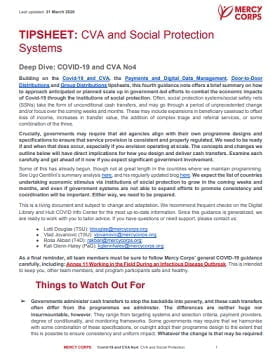
Tipsheet: CVA and social protection systems (COVID-19)
Guidelines and Tools
Building on the Covid-19 and CVA, the Payments and Digital Data Management, Door-to-Door Distributions and Group Distributions tipsheets, this fourth guidance note offers a brief summary on how to approach anticipated or planned scale up in government-led efforts to combat the economic impacts of Covid-19...
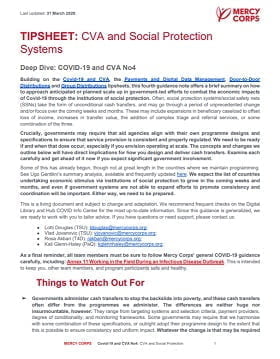
Mercy Corps’ tipsheet No 4: CVA and Social Protection Systems
Guidelines and Tools
Mercy Corps’ Tipsheet 4 – CVA and Social Protection Systems
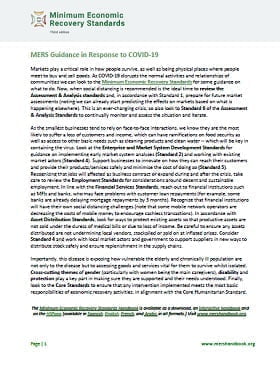
MERS Guidance in Response to COVID-19
Guidelines and Tools
Markets play a critical role in how people survive, as well as being physical places where people meet to buy and sell goods. As COVID-19 disrupts the normal activities and relationships of communities we can look to the Minimum Economic Recovery Standards for some guidance on what to do. Now, when social...
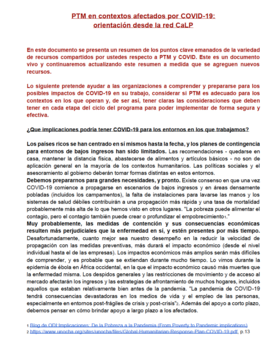
PTM en contextos afectados por COVID-19: orientación desde la red la CALP Network
Guía y herramientas
En este documento se presenta un resumen de los puntos clave emanados de la variedad de recursos compartidos por ustedes respecto a PTM y COVID. Este es un documento vivo y continuaremos actualizando este resumen a medida que se agreguen nuevos recursos. Lo siguiente pretende ayudar a las organizaciones...
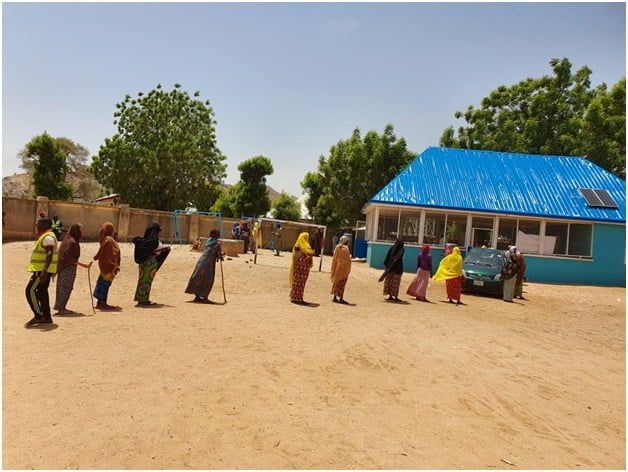
COVID-19 and CVA: how are operational actors responding?
Blog Post
“The COVID-19 pandemic will have devastating consequences on people’s livelihoods and employment, especially in post-fragile, crisis and post-crisis environments.” Global Humanitarian Response Plan: COVID-19 We don’t yet know exactly how the COVID-19 pandemic will be experienced by the world’s...

Looking into 2020: short overview on global clusters, CVA and the CALP Network
Presentation
Overview as 2020 begins:
• Significant progress and commitment from all global clusters on integration of CVA into their work.
• Significant interest in different regions and by some donors on sector-specific CVA.
• Challenges that remain:
o Dialogue: 1) Ensuring CVA specialists...
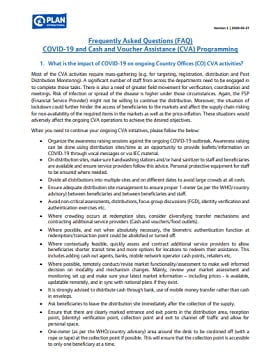
Frequently Asked Questions (FAQ) – COVID-19 and Cash and Voucher Assistance (CVA) Programming
Guidelines and Tools
This document has enlisted some key questions and their possible solutions in relation to COVID-19 response through cash and/or vouchers. This is a live document, which will be updated periodically.
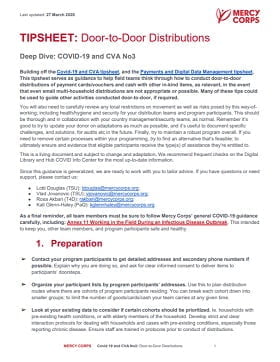
Mercy Corps Tipsheet No 3: Door to Door Distributions
Guidelines and Tools
Mercy Corps Tipsheet No 3: Door to Door Distributions
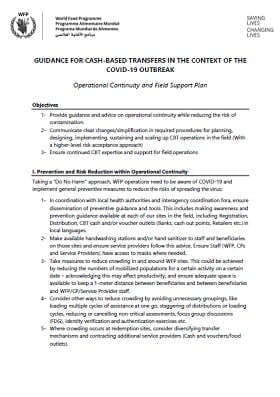
WFP – Guidance for Cash-based Transfers in the Context of the Covid-19 Outbreak
Guidelines and Tools
The objectives of this document are:
1- Provide guidance and advice on operational continuity while reducing the risk of contamination.
2- Communicate clear changes/simplification in required procedures for planning, designing, implementing, sustaining and scaling up CBT operations in the field (With a...
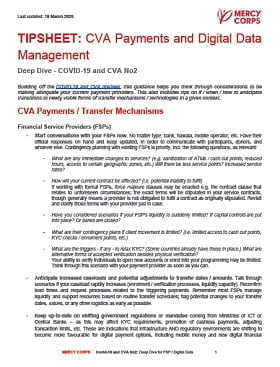
Mercy Corps Tipsheet: CVA payments and digital data management
Guidelines and Tools
Building off the COVID-19 and CVA tipsheet , this guidance helps you think through considerations to be making alongside your current payment providers. This also includes tips on if/when/how to anticipate
transitions to newly viable forms of transfer mechanisms/technologies in a given context.

Cash and Voucher Assistance and the Covid-19 Outbreak, Syria
Guidelines and Tools
This documents intents to provide guidance and advice on how to best adapt Cash and Voucher Assistance (CVA) programming during the current Covid-19 outbreak and specifically how to manage CVA during the outbreak and how to operate while reducing the risk of contamination
This document is a compilation of...
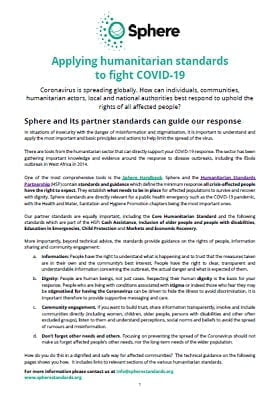
Sphere: Humanitarian Standards and Coronavirus 2020
Guidelines and Tools
Coronavirus is spreading globally. How can individuals, communities,
humanitarian actors, local and national authorities best respond to uphold the rights of all affected people?

ICRC Tipsheet: Cash and Voucher Assistance and COVID-19
Guidelines and Tools
This tipsheet serves as guidance to help field teams think through different ways:
1) to mitigate the spread of COVID-19 through ongoing Cash and Voucher Assistance (CVA);
2) inform the adaptation of CVA in the context of COVID-19;
3) promote sensitivity to evolving markets dynamics.
This tipsheet is...
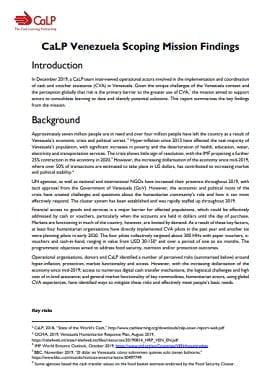
The CALP Network Venezuela Scoping Mission Findings
Report
In December 2019, a the CALP Network team interviewed operational actors involved in the implementation and coordination of cash and voucher assistance (CVA) in Venezuela. Given the unique challenges of the Venezuela context and the perception globally that risk is the primary barrier to the greater use...

CVA and Gender in West and Central Africa
Event